Burt A. The Evolution of the British Empire and Commonwealth From the American Revolution
Подождите немного. Документ загружается.

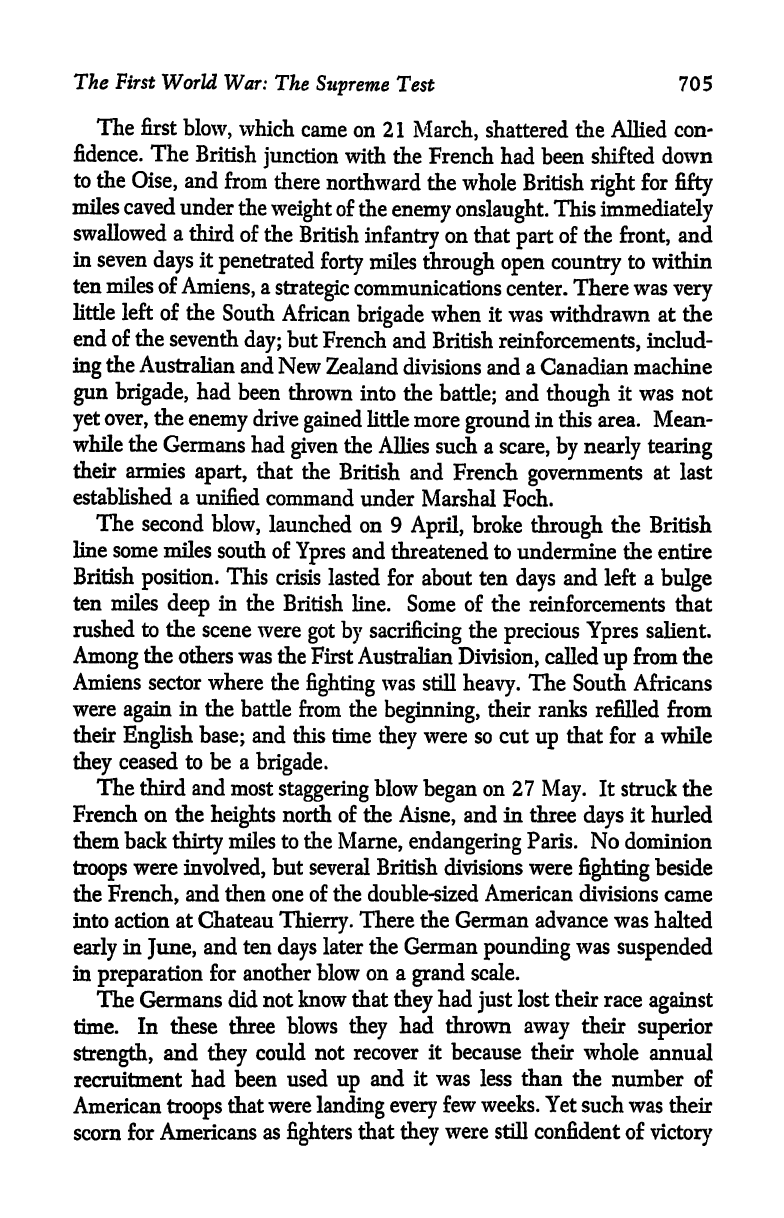
The
First
World
War:
The
Supreme
Test
705
The
first
blow,
which
came
on
21
March,
shattered
the Allied
con-
fidence.
The
British
junction
with
the French
had
been
shifted down
to the
Oise,
and
from
there
northward the
whole
British
right
for
fifty
miles
caved
under
the
weight
of the
enemy
onslaught.
This
immediately
swallowed
a
third
of
the
British
infantry
on that
part
of
the
front,
and
in
seven
days
it
penetrated
forty
miles
through
open
country
to
within
ten miles
of
Amiens,
a
strategic
communications
center.
There
was
very
little left
of the
South
African
brigade
when
it
was
withdrawn
at
the
end of the
seventh
day;
but
French
and British
reinforcements,
includ-
ing
the
Australian
and
New
Zealand
divisions and
a
Canadian
machine
gun
brigade,
had
been
thrown
into the
battle;
and
though
it was not
yet
over,
the
enemy
drive
gained
little
more
ground
in
this area. Mean-
while the
Germans
had
given
the
Allies such
a
scare,
by
nearly
tearing
their armies
apart,
that the
British and
French
governments
at last
established
a
unified
command
under
Marshal Foch,
The
second
blow,
launched
on 9
April,
broke
through
the
British
line some miles
south
of
Ypres
and
threatened to undermine
the
entire
British
position.
This
crisis
lasted for about ten
days
and left
a
bulge
ten miles
deep
in
the
British line.
Some of the reinforcements
that
rushed
to the
scene were
got by
sacrificing
the
precious
Ypres
salient.
Among
the
others
was
the First
Australian
Division,
called
up
from
the
Amiens sector
where the
fighting
was
still
heavy.
The
South Africans
were
again
in
the
battle
from
the
beginning,
their ranks
refilled from
their
English
base;
and this
time
they
were so
cut
up
that
for
a while
they
ceased to
be
a
brigade.
The
third and
most
staggering
blow
began
on 27
May.
It
struck
the
French on the
heights
north
of the
Aisne,
and
in
three
days
it
hurled
them
back
thirty
miles to the
Marne,
endangering
Paris. No
dominion
troops
were
involved,
but
several British
divisions were
fighting
beside
the
French,
and then one of the double-sized
American
divisions came
into action
at
Chateau
Thierry.
There the German
advance
was
halted
early
in
June,
and
ten
days
later
the
German
pounding
was
suspended
in
preparation
for another
blow
on
a
grand
scale.
The
Germans
did
not know that
they
had
just
lost
their
race
against
time.
In these three
blows
they
had thrown
away
their
superior
strength,
and
they
could
not
recover
it
because their
whole
annual
recruitment
had been
used
up
and
it was
less
than
the
number of
American
troops
that
were
landing
every
few
weeks.
Yet
such
was their
scorn
for
Americans
as
fighters
that
they
were
still confident
of
victory
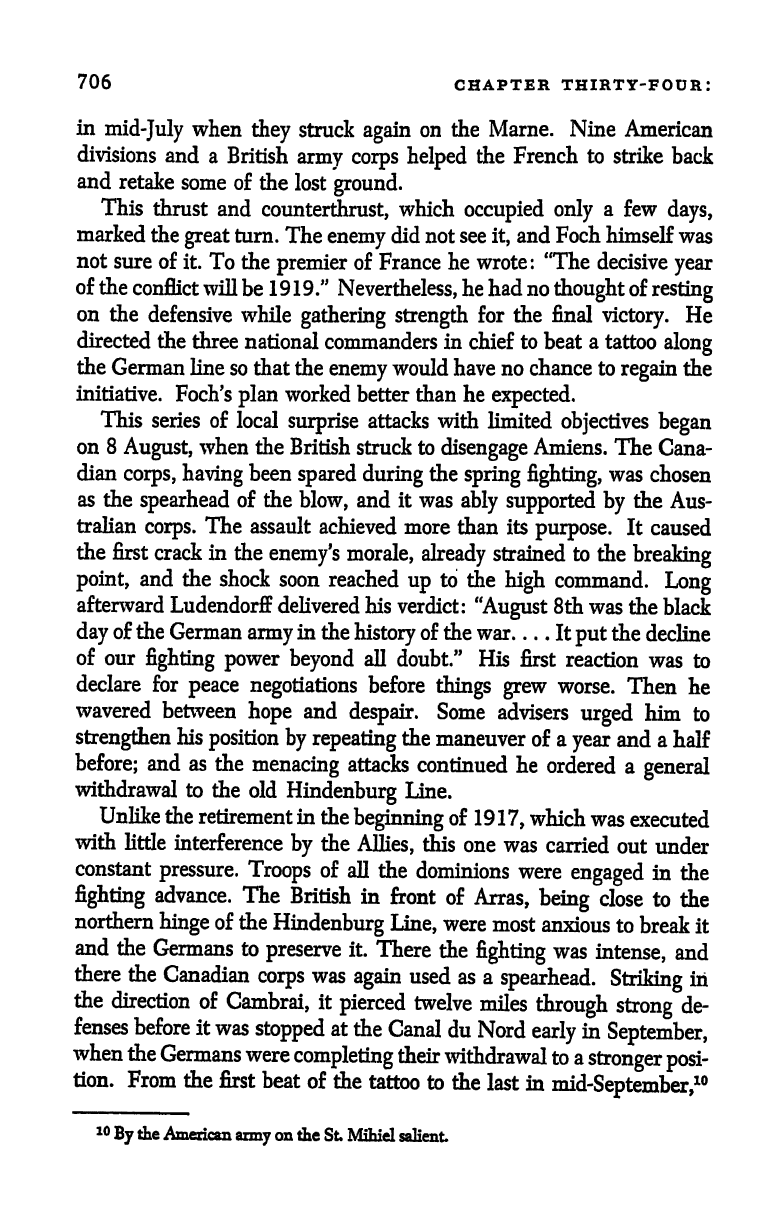
706
CHAPTER THIRTY-FOUR:
in
mid-July
when
they
struck
again
on
the
Maine. Nine
American
divisions
and
a
British
army
corps helped
the
French
to strike
back
and
retake
some
of
the
lost
ground.
This
thrust
and
counterthrust,
which
occupied
only
a
few
days,
marked
the
great
turn.
The
enemy
did
not
see
it,
and
Foch
himself
was
not
sure
of
it.
To the
premier
of
France he wrote:
"The
decisive
year
of
the
conflict
will
be
1919."
Nevertheless,
he had no
thought
of
resting
on
the
defensive while
gathering
strength
for
the final
victory.
He
directed the
three
national commanders in
chief
to beat
a
tattoo
along
the
German line
so
that
the
enemy
would have no chance to
regain
the
initiative.
Foch's
plan
worked better than he
expected.
This
series of
local
surprise
attacks with limited
objectives
began
on
8
August,
when the
British
struck to
disengage
Amiens,
The Cana-
dian
corps,
having
been
spared
during
the
spring fighting,
was
chosen
as the
spearhead
of the
blow,
and
it
was
ably
supported
by
the
Aus-
tralian
corps.
The
assault
achieved more than
its
purpose.
It
caused
the
first
crack in the
enemy's
morale,
already
strained to the
breaking
point,
and the
shock
soon
reached
up
to
the
high
command.
Long
afterward
Ludendorff
delivered his
verdict:
"August
8th
was the
black
day
of
the
German
army
in
the
history
of
the war
It
put
the
decline
of our
fighting power beyond
all doubt."
His
first
reaction
was
to
declare
for
peace
negotiations
before
things grew
worse.
Then
he
wavered
between
hope
and
despair.
Some
advisers
urged
him
to
strengthen
his
position
by
repeating
the
maneuver
of a
year
and
a
half
before;
and as the
menacing
attacks
continued
he
ordered a
general
withdrawal
to
the old
Hindenburg
line.
Unlike
the
retirement in
the
beginning
of
1917,
which
was
executed
with
little
interference
by
the
Allies,
this
one
was
carried
out
under
constant
pressure.
Troops
of
all the
dominions
were
engaged
in the
fighting
advance.
The
British
in
front
of
Arras,
being
close
to the
northern
hinge
of the
Hindenburg
Line,
were
most
anxious
to
break
it
and the
Germans
to
preserve
it.
There
the
fighting
was
intense,
and
there
the
Canadian
corps
was
again
used as a
spearhead.
Striking
in
the
direction
of
Cambrai,
it
pierced
twelve
miles
through
strong
de-
fenses
before
it
was
stopped
at
the
Canal du
Nord
early
in
September,
when
the
Germans
were
completing
their
withdrawal
to
a
stronger
posi-
tion.
From
the
first beat
of
the
tattoo to
the
last
in
mid-September,
10
10
By
the
American
army
on
the
St.
Mihiel
salient
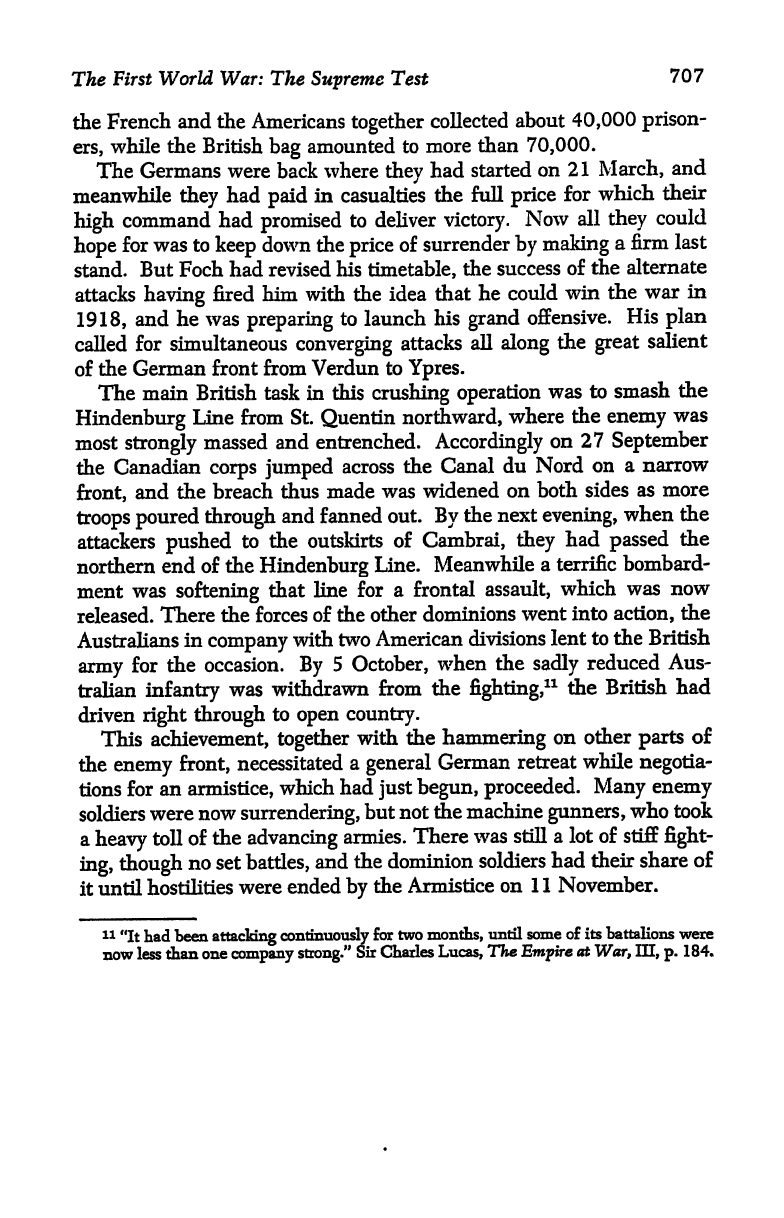
The
First
World War:
The
Supreme
Test
707
the
French
and
the
Americans
together
collected
about
40,000
prison-
ers,
while
the
British
bag
amounted
to
more
than
70,000.
The
Germans
were
back
where
they
had
started
on
21
March,
and
meanwhile
they
had
paid
in
casualties
the
full
price
for
which
their
high
command had
promised
to
deliver
victory.
Now
all
they
could
hope
for
was to
keep
down the
price
of
surrender
by
making
a firm
last
stand.
But
Foch
had revised his
timetable,
the success
of
the
alternate
attacks
having
fired
him with
the
idea
that he
could
win
the
war
in
1918,
and
he was
preparing
to launch
his
grand
offensive.
His
plan
called
for
simultaneous
converging
attacks
all
along
the
great
salient
of
the German
front from
Verdun
to
Ypres.
The
main British task in this
crushing
operation
was to
smash
the
Hindenburg
Line from
St.
Quentin
northward,
where
the
enemy
was
most
strongly
massed
and
entrenched.
Accordingly
on
27
September
the
Canadian
corps jumped
across
the Canal
du
Nord
on
a narrow
front,
and
the
breach
thus made was
widened
on
both sides
as
more
troops poured
through
and fanned out.
By
the
next
evening,
when
the
attackers
pushed
to
the outskirts
of
Cambrai,
they
had
passed
the
northern
end of
the
Hindenburg
Line.
Meanwhile
a terrific
bombard-
ment
was
softening
that line
for
a frontal
assault,
which
was
now
released.
There
the forces
of the other
dominions
went into
action,
the
Australians
in
company
with two
American
divisions
lent
to
the British
army
for
the occasion.
By
5
October,
when
the
sadly
reduced
Aus-
tralian
infantry
was
withdrawn
from the
fighting,
11
the
British had
driven
right through
to
open
country.
This
achievement,
together
with
the
hammering
on other
parts
of
the
enemy
front,
necessitated
a
general
German
retreat while
negotia-
tions
for
an
armistice,
which
had
just begun,
proceeded.
Many
enemy
soldiers
were
now
surrendering,
but
not
the
machine
gunners,
who took
a
heavy
toll
of
the
advancing
armies. There
was still
a lot of stiff
fight-
ing,
though
no
set
battles,
and
the
dominion
soldiers
had their share
of
it
until
hostilities
were
ended
by
the Armistice
on 1 1 November.
11
"It
had
been
attacking
continuously
for
two
months,
until some of its
battalions were
now
less
than
one
company
strong."
Sir Charles
Lucas,
The
Empire
at
War,
HI,
p.
184.
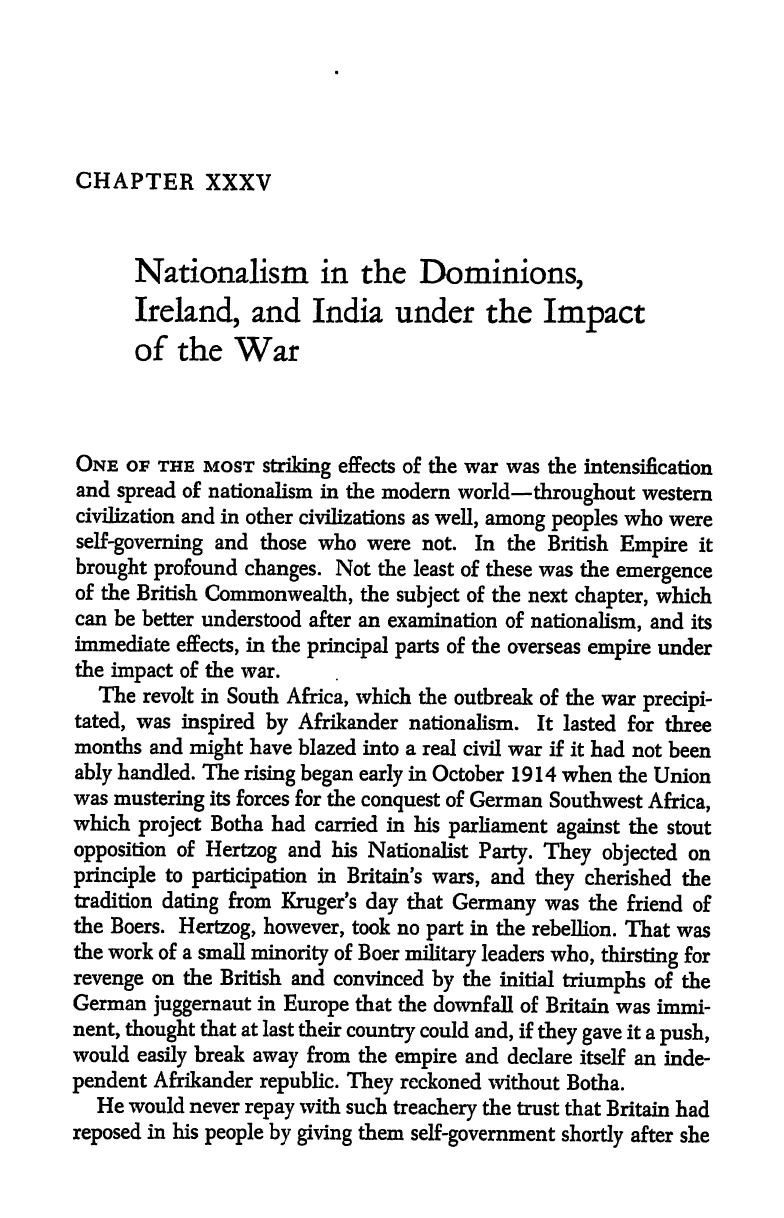
CHAPTER
XXXV
Nationalism
in
the
Dominions,
Ireland,
and
India
under
the
Impact
of the
War
ONE
OF
THE
MOST
striking
effects
of the war was
the
intensification
and
spread
of
nationalism
in the
modern
world
throughout
western
civilization
and in
other
civilizations
as
well,
among
peoples
who
were
self-governing
and
those
who were
not.
In
the British
Empire
it
brought profound
changes.
Not
the least
of these
was the
emergence
of
the
British
Commonwealth,
the
subject
of
the
next
chapter,
which
can
be
better
understood after an
examination
of
nationalism,
and
its
immediate
effects,
in
the
principal
parts
of the
overseas
empire
under
the
impact
of the war.
The
revolt
in
South
Africa,
which
the
outbreak
of
the war
precipi-
tated,
was
inspired by
Afrikander
nationalism.
It
lasted
for
three
months
and
might
have
blazed
into
a
real
civil war
if it
had not
been
ably
handled. The
rising
began early
in
October
1914
when the
Union
was
mustering
its
forces for
the
conquest
of
German
Southwest
Africa,
which
project
Botha
had
carried
in
his
parliament
against
the
stout
opposition
of
Hertzog
and his
Nationalist
Party.
They
objected
on
principle
to
participation
in
Britain's
wars,
and
they
cherished the
tradition
dating
from
Kruger's day
that
Germany
was
the
friend of
the
Boers.
Hertzog,
however,
took
no
part
in
the
rebellion.
That
was
the work
of
a
small
minority
of
Boer
military
leaders
who,
thirsting
for
revenge
on the
British
and
convinced
by
die
initial
triumphs
of
the
German
juggernaut
in
Europe
that
the
downf
all of
Britain
was
immi-
nent,
thought
that
at last
their
country
could
and,
if
they
gave
it
a
push,
would
easily
break
away
from
the
empire
and
declare
itself
an
inde-
pendent
Afrikander
republic.
They
reckoned
without
Botha.
He
would
never
repay
with
such
treachery
the trust
that
Britain
had
reposed
in
his
people
by
giving
them
self-government
shortly
after
she
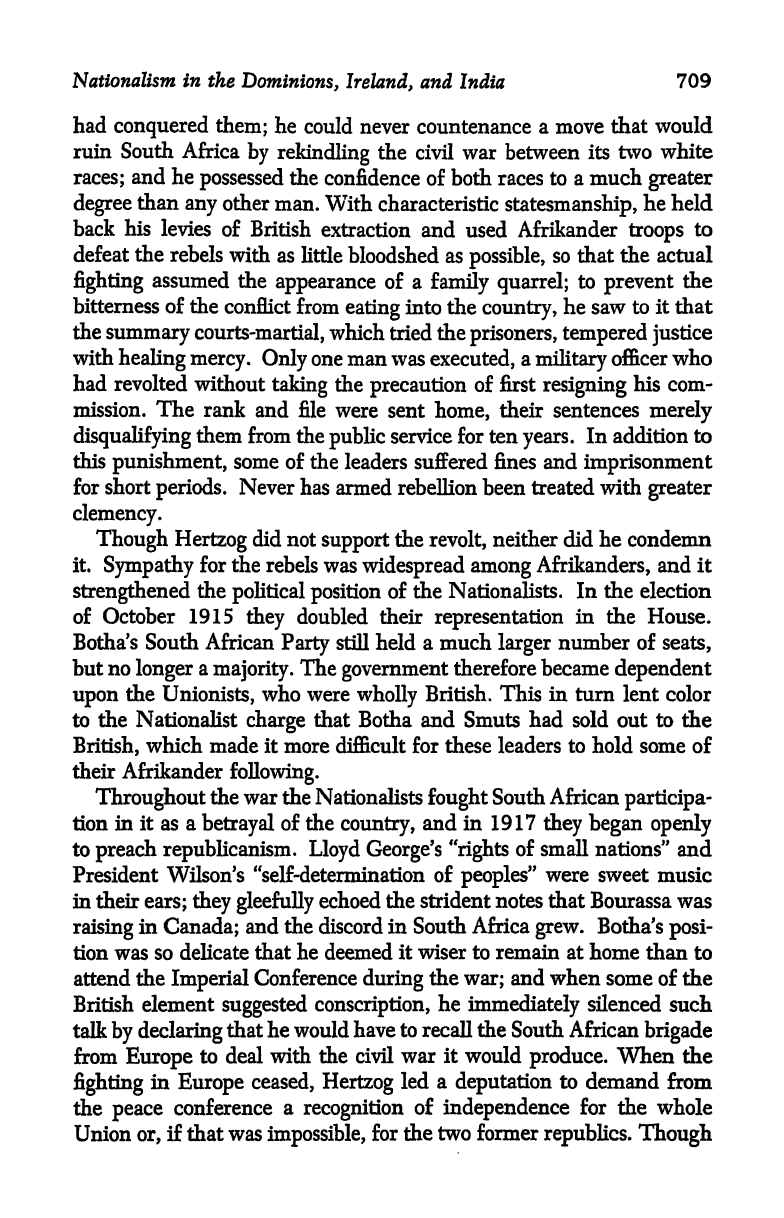
Nationalism
in
the
Dominions,
Ireland,
and
India
709
had
conquered
them;
he
could never
countenance
a move
that would
ruin
South
Africa
by
rekindling
the civil
war
between
its
two
white
races;
and
he
possessed
the
confidence
of
both races to
a much
greater
degree
than
any
other
man.
With characteristic
statesmanship,
he
held
back
his
levies
of
British
extraction and
used
Afrikander
troops
to
defeat
the
rebels
with as
little
bloodshed as
possible,
so that
the actual
fighting
assumed the
appearance
of a
family quarrel;
to
prevent
the
bitterness
of the
conflict
from
eating
into the
country,
he saw
to
it that
the
summary
courts-martial,
which
tried
the
prisoners,
tempered
justice
with
healing mercy.
Only
one man
was
executed,
a
military
officer
who
had revolted without
taking
the
precaution
of
first
resigning
his com-
mission.
The
rank
and file
were sent
home,
their sentences
merely
disqualifying
them
from the
public
service for
ten
years.
In addition
to
this
punishment,
some
of the
leaders suffered
fines and
imprisonment
for
short
periods.
Never
has
armed
rebellion
been
treated with
greater
clemency.
Though
Hertzog
did
not
support
the
revolt,
neither
did
he
condemn
it.
Sympathy
for the
rebels was
widespread
among
Afrikanders,
and it
strengthened
the
political position
of
the Nationalists. In
the
election
of October
1915
they
doubled
their
representation
in the House.
Botha's
South
African
Party
still held
a
much
larger
number of
seats,
but
no
longer
a
majority.
The
government
therefore became
dependent
upon
the
Unionists,
who were
wholly
British. This in
turn
lent
color
to
the
Nationalist
charge
that
Botha and Smuts had sold out
to
the
British,
which
made it more difficult for these leaders
to
hold some of
their Afrikander
following.
Throughout
the
war
the Nationalists
fought
South African
participa-
tion
in
it
as a
betrayal
of
the
country,
and
in
1917
they began
openly
to
preach
republicanism. Lloyd
George's
"rights
of
small
nations"
and
President
Wilson's "self-determination of
peoples"
were sweet
music
in their
ears;
they gleefully
echoed
the
strident notes
that
Bourassa was
raising
in
Canada;
and
the
discord
in
South
Africa
grew.
Botha's
posi-
tion was so
delicate
that he
deemed
it
wiser to
remain at
home
than to
attend
the
Imperial
Conference
during
the
war;
and when
some of the
British
element
suggested
conscription,
he
immediately
silenced
such
talk
by
declaring
that he
would
have
to
recall the South African
brigade
from
Europe
to deal with
the civil
war it would
produce.
When the
fighting
in
Europe
ceased,
Hertzog
led
a
deputation
to demand
from
the
peace
conference
a
recognition
of
independence
for the
whole
Union
or,
if
that was
impossible,
for the
two
former
republics.
Though
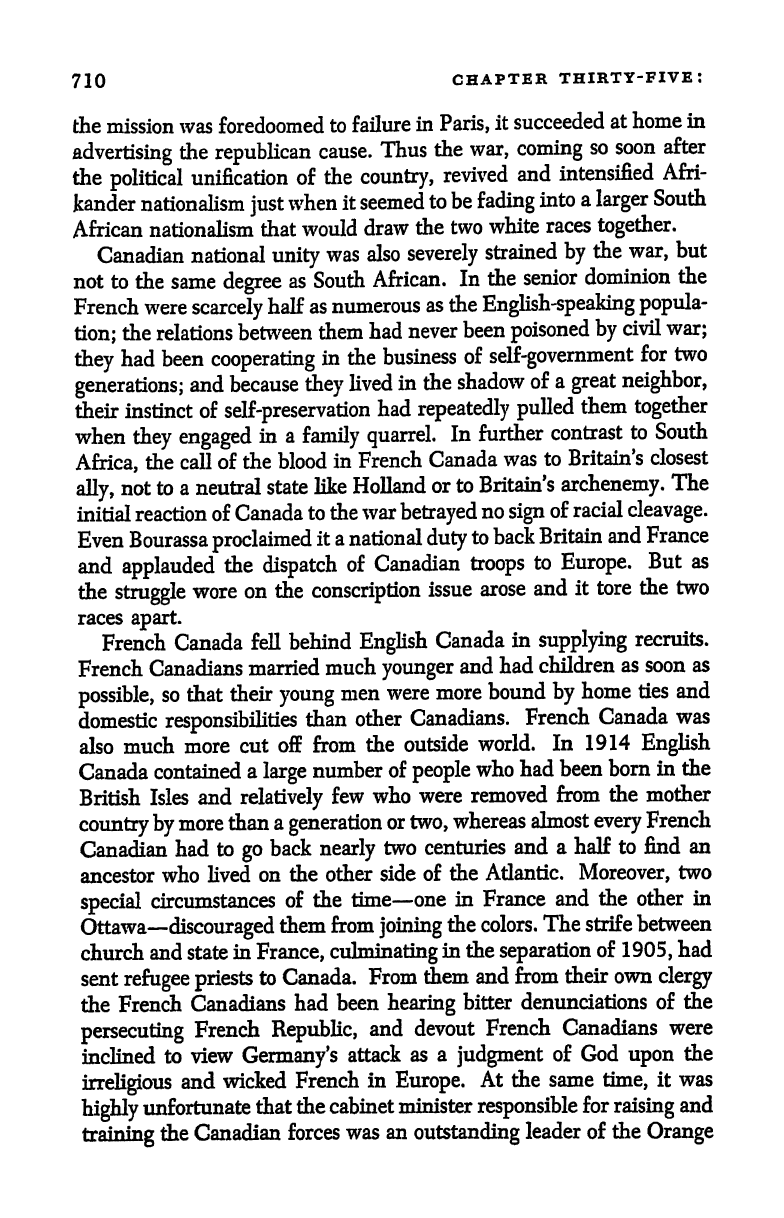
710
CHAPTER
THIRTY-FIVE:
the
mission
was foredoomed
to
failure
in
Paris,
it
succeeded
at
home in
advertising
the
republican
cause.
Thus
the
war,
coming
so soon
after
the
political
unification
of
the
country,
revived
and
intensified
Afri-
kander
nationalism
just
when
it
seemed
to
be
fading
into
a
larger
South
African
nationalism
that would
draw
the
two
white
races
together.
Canadian
national
unity
was
also
severely
strained
by
the
war,
but
not
to the same
degree
as
South
African.
In
the
senior
dominion
the
French were
scarcely
half
as
numerous
as the
English-speaking
popula-
tion;
the
relations
between
them
had
never
been
poisoned
by
civil
war;
they
had
been
cooperating
in
the
business
of
self-government
for
two
generations;
and because
they
lived
in the
shadow
of
a
great
neighbor,
their
instinct of
self-preservation
had
repeatedly
pulled
them
together
when
they engaged
in
a
family
quarrel.
In
further
contrast
to
South
Africa,
the
call
of
the blood
in
French
Canada
was
to
Britain's
closest
ally,
not
to
a neutral
state
like
Holland
or
to
Britain's
archenemy.
The
initial
reaction
of
Canada
to
the
war
betrayed
no
sign
of
racial
cleavage.
Even
Bourassa
proclaimed
it a
national
duty
to
back
Britain
and
France
and
applauded
the
dispatch
of
Canadian
troops
to
Europe.
But as
the
struggle
wore
on
the
conscription
issue
arose
and
it
tore
the two
races
apart.
French
Canada
fell behind
English
Canada
in
supplying
recruits.
French
Canadians
married
much
younger
and
had
children
as soon
as
possible,
so
that
their
young
men
were
more
bound
by
home
ties
and
domestic
responsibilities
than
other
Canadians.
French
Canada
was
also
much
more
cut
off from
the
outside
world.
In
1914
English
Canada
contained
a
large
number
of
people
who
had
been born
in
the
British
Isles
and
relatively
few
who
were
removed
from
the
mother
country
by
more
than
a
generation
or
two,
whereas
almost
every
French
Canadian
had
to
go
back
nearly
two
centuries
and
a half to
find
an
ancestor
who
lived
on
the
other
side
of
the
Atlantic.
Moreover,
two
special
circumstances
of
the
time
one
in France
and
the other
in
Ottawa
discouraged
them
from
joining
the colors.
The
strife
between
church
and state
in
France,
culminating
in the
separation
of
1905,
had
sent
refugee
priests
to
Canada.
From
them and
from
their own
clergy
the
French
Canadians
had
been
hearing
bitter
denunciations
of
the
persecuting
French
Republic,
and
devout
French
Canadians
were
inclined
to
view
Germany's
attack
as
a
judgment
of God
upon
the
irreligious
and
wicked
French
in
Europe.
At the
same
time,
it
was
highly
unfortunate
that
the
cabinet
minister
responsible
for
raising
and
training
the
Canadian
forces
was
an
outstanding
leader
of
the
Orange
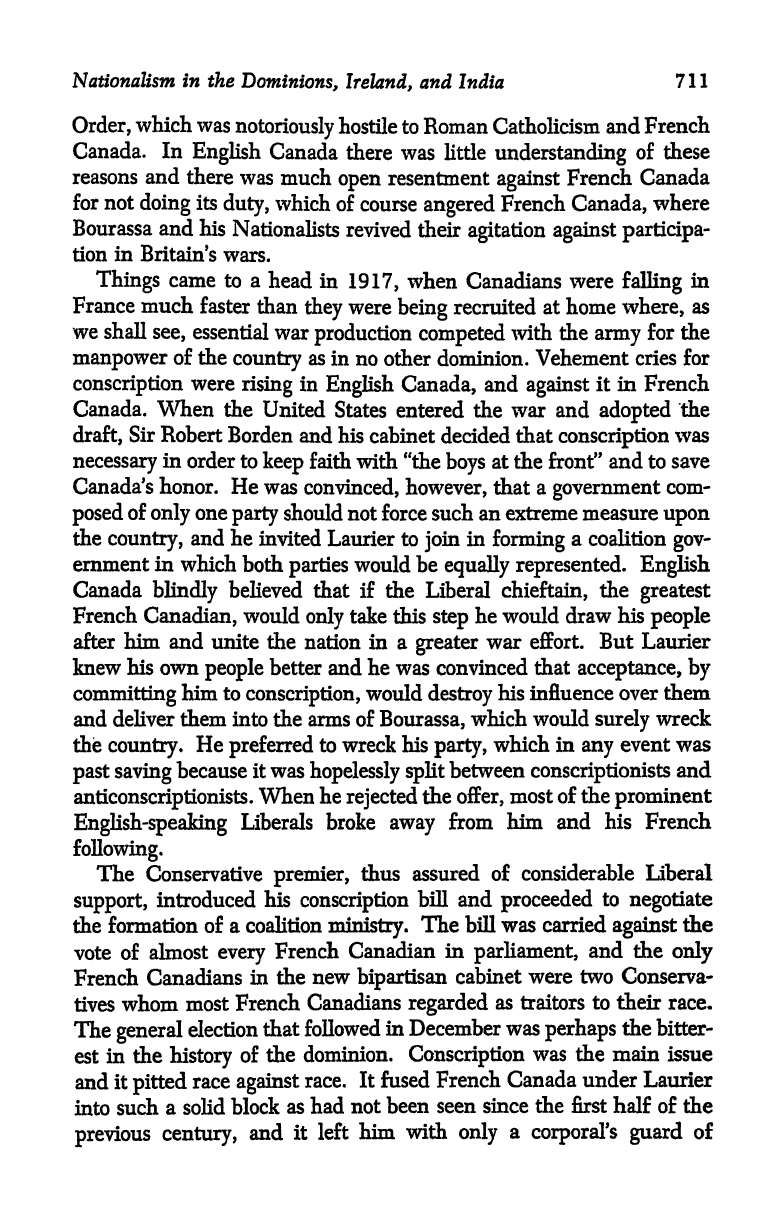
Nationalism
in
the
Dominions,
Ireland,
and
India
711
Order,
which
was
notoriously
hostile
to Roman
Catholicism
and
French
Canada.
In
English
Canada there was little
understanding
of these
reasons
and
there
was
much
open
resentment
against
French
Canada
for
not
doing
its
duty,
which of
course
angered
French
Canada,
where
Bourassa
and his
Nationalists
revived
their
agitation against
participa-
tion
in
Britain's
wars.
Things
came
to
a
head in
1917,
when Canadians
were
falling
in
France
much
faster
than
they
were
being
recruited
at
home
where,
as
we
shall
see,
essential war
production
competed
with the
army
for
the
manpower
of the
country
as
in
no other
dominion.
Vehement
cries for
conscription
were
rising
in
English
Canada,
and
against
it
in
French
Canada. When the
United
States entered the
war
and
adopted
the
draft,
Sir Robert
Borden
and his
cabinet decided
that
conscription
was
necessary
in
order to
keep
faith with
"the
boys
at
the
front" and to
save
Canada's
honor. He
was
convinced,
however,
that
a
government
com-
posed
of
only
one
party
should not force such an
extreme measure
upon
the
country,
and
he
invited Laurier to
join
in
forming
a
coalition
gov-
ernment
in
which
both
parties
would be
equally represented. English
Canada
blindly
believed that if the
Liberal
chieftain,
the
greatest
French
Canadian,
would
only
take
this
step
he would draw
his
people
after him
and
unite the
nation in a
greater
war effort.
But
Laurier
knew
his own
people
better and
he
was convinced
that
acceptance,
by
committing
him
to
conscription,
would
destroy
his influence
over
them
and
deliver
them
into
the
arms
of
Bourassa,
which would
surely
wreck
the
country.
He
preferred
to
wreck his
party,
which in
any
event
was
past saving
because it
was
hopelessly split
between
conscriptionists
and
anticonscriptionists.
When
he
rejected
the
offer,
most
of the
prominent
English-speaking
Liberals
broke
away
from
him and
his French
following.
The
Conservative
premier,
thus assured of
considerable Liberal
support,
introduced
his
conscription
bill
and
proceeded
to
negotiate
the formation
of a coalition
ministry.
The
bill
was
carried
against
the
vote
of
almost
every
French
Canadian
in
parliament,
and the
only
French
Canadians
in
the new
bipartisan
cabinet
were two
Conserva-
tives
whom
most
French
Canadians
regarded
as
traitors to
their
race.
The
general
election
that followed
in
December
was
perhaps
the
bitter-
est
in the
history
of
the
dominion.
Conscription
was
the
main issue
and it
pitted
race
against
race.
It
fused French
Canada
under
Laurier
into
such
a
solid
block
as had
not been
seen
since
the first
half of the
previous
century,
and it
left
him
with
only
a
corporal's guard
of
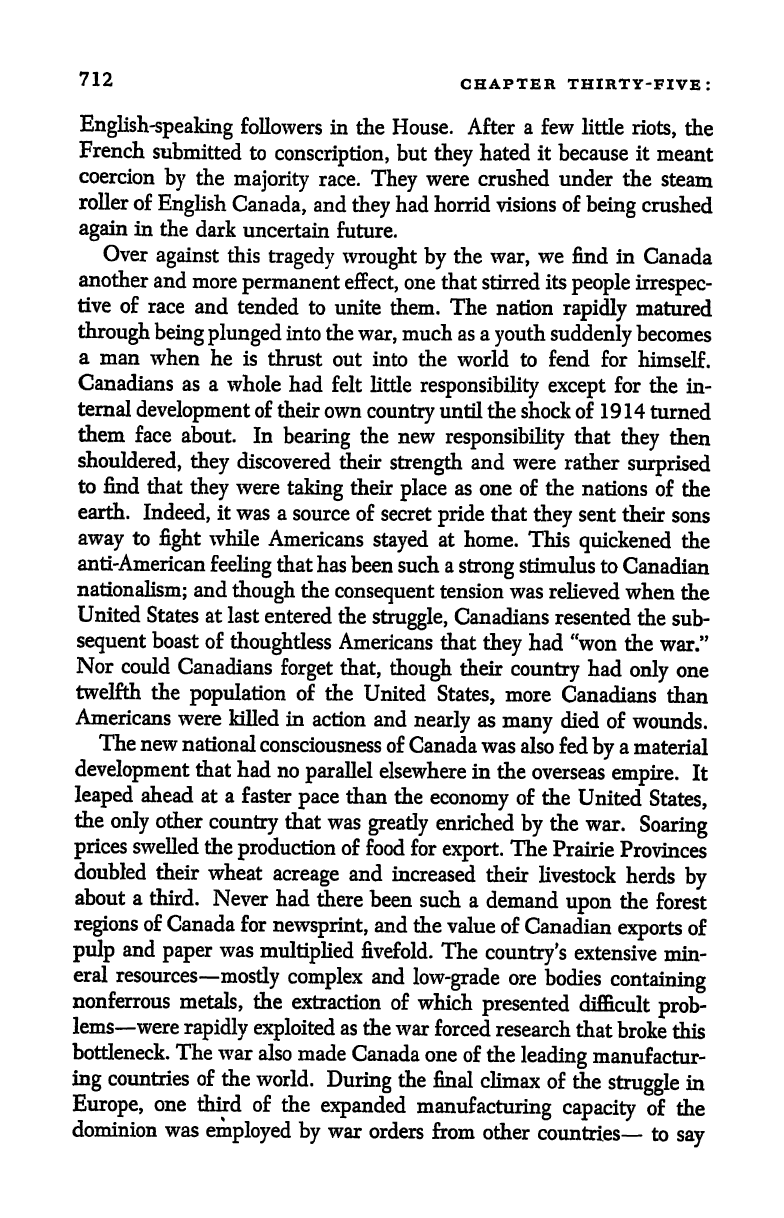
712
CHAPTER
THIRTY-FIVE:
English-speaking
followers
in the
House.
After
a
few
little
riots,
the
French
submitted
to
conscription,
but
they
hated it because it
meant
coercion
by
the
majority
race.
They
were
crushed
under
the
steam
roller
of
English
Canada,
and
they
had
horrid
visions
of
being
crushed
again
in
the
dark
uncertain
future.
Over
against
this
tragedy
wrought
by
the
war,
we
find in
Canada
another
and
more
permanent
effect,
one
that
stirred
its
people
irrespec-
tive
of
race
and
tended
to unite
them.
The
nation
rapidly
matured
through
being
plunged
into
the
war,
much
as a
youth
suddenly
becomes
a
man
when
he
is
thrust out
into the
world to fend for
himself.
Canadians
as a
whole
had
felt little
responsibility except
for
the
in-
ternal
development
of their
own
country
until the
shock
of
19
14
turned
them
face
about. In
bearing
the new
responsibility
that
they
then
shouldered,
they
discovered
their
strength
and were
rather
surprised
to
find that
they
were
taking
their
place
as one
of the
nations
of
the
earth.
Indeed,
it
was a
source
of secret
pride
that
they
sent
their
sons
away
to
fight
while
Americans
stayed
at home.
This
quickened
the
anti-American
feeling
that
has
been
such
a
strong
stimulus to
Canadian
nationalism;
and
though
the
consequent
tension
was
relieved
when
the
United
States at
last
entered the
struggle,
Canadians
resented
the
sub-
sequent
boast
of
thoughtless
Americans
that
they
had
"won
the
war."
Nor
could
Canadians
forget
that,
though
their
country
had
only
one
twelfth
the
population
of
the
United
States,
more
Canadians
than
Americans
were
killed in
action
and
nearly
as
many
died
of
wounds.
The
new
national
consciousness
of
Canada
was
also
fed
by
a
material
development
that
had
no
parallel
elsewhere
in the
overseas
empire.
It
leaped
ahead
at
a
faster
pace
than
the
economy
of
the
United
States,
the
only
other
country
that
was
greatly
enriched
by
the
war.
Soaring
prices
swelled
the
production
of
food
for
export.
The
Prairie
Provinces
doubled their
wheat
acreage
and
increased their
livestock
herds
by
about a
third.
Never
had
there
been
such a
demand
upon
the
forest
regions
of
Canada
for
newsprint,
and the
value
of
Canadian
exports
of
pulp
and
paper
was
multiplied
fivefold.
The
country's
extensive
min-
eral
resources
mostly
complex
and
low-grade
ore
bodies
containing
nonferrous
metals,
the
extraction
of
which
presented
difficult
prob-
lemswere
rapidly
exploited
as
the war
forced
research
that
broke
this
bottleneck.
The
war
also made
Canada
one
of
the
leading
manufactur-
ing
countries
of
the
world.
During
the
final
climax
of
the
struggle
in
Europe,
one
third of
the
expanded
manufacturing
capacity
of
the
dominion was
employed
by
war
orders from
other
countri.es to
say
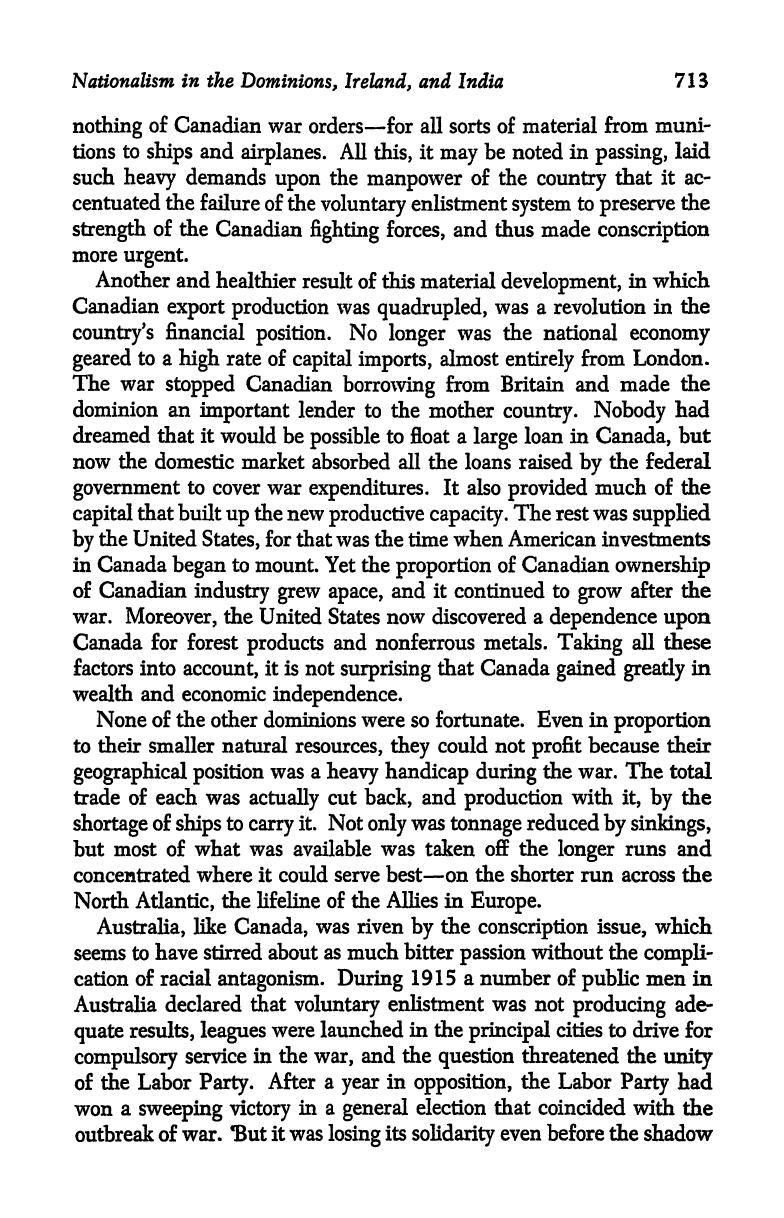
Nationalism
in
the
Dominions,
Ireland,
and India
713
nothing
of
Canadian
war
orders
for
all
sorts
of material
from
muni-
tions
to
ships
and
airplanes.
All
this,
it
may
be noted
in
passing,
laid
such
heavy
demands
upon
the
manpower
of the
country
that
it
ac-
centuated
the
failure
of the
voluntary
enlistment
system
to
preserve
the
strength
of the
Canadian
fighting
forces,
and thus made
conscription
more
urgent.
Another
and
healthier
result of this material
development,
in
which
Canadian
export production
was
quadrupled,
was
a revolution
in
the
country's
financial
position.
No
longer
was
the national
economy
geared
to
a
high
rate
of
capital
imports,
almost
entirely
from
London.
The war
stopped
Canadian
borrowing
from
Britain and
made
the
dominion
an
important
lender to
the
mother
country.
Nobody
had
dreamed
that
it
would be
possible
to float a
large
loan
in
Canada,
but
now the domestic market
absorbed
all
the loans
raised
by
the federal
government
to
cover war
expenditures.
It
also
provided
much
of
the
capital
that
built
up
the
new
productive
capacity.
The rest
was
supplied
by
the
United
States,
for
that was the
time when American investments
in
Canada
began
to mount.
Yet the
proportion
of Canadian
ownership
of
Canadian
industry
grew
apace,
and
it
continued
to
grow
after the
war.
Moreover,
the
United States now discovered
a
dependence
upon
Canada
for forest
products
and
nonferrous
metals.
Taking
all these
factors
into
account,
it is
not
surprising
that
Canada
gained greatly
in
wealth
and economic
independence.
None
of
the
other
dominions
were so
fortunate.
Even
in
proportion
to
their
smaller
natural
resources,
they
could not
profit
because
their
geographical
position
was
a
heavy
handicap
during
the
war.
The
total
trade of each was
actually
cut
back,
and
production
with
it,
by
the
shortage
of
ships
to
carry
it. Not
only
was
tonnage
reduced
by sinkings,
but
most of what
was
available
was
taken
off the
longer
runs
and
concentrated
where
it
could
serve
best on
the shorter
run
across the
North
Atlantic,
the
lifeline
of
the
Allies in
Europe.
Australia,
like
Canada,
was riven
by
the
conscription
issue,
which
seems
to
have stirred about
as
much bitter
passion
without the
compli-
cation of
racial
antagonism.
During
1915 a
number
of
public
men in
Australia
declared
that
voluntary
enlistment was
not
producing
ade-
quate
results,
leagues
were
launched
in the
principal
cities to
drive
for
compulsory
service
in
the
war,
and the
question
threatened the
unity
of
the Labor
Party.
After
a
year
in
opposition,
the
Labor
Party
had
won
a
sweeping
victory
in a
general
election
that
coincided with
the
outbreak
of
war. *But
it
was
losing
its
solidarity
even before
the
shadow
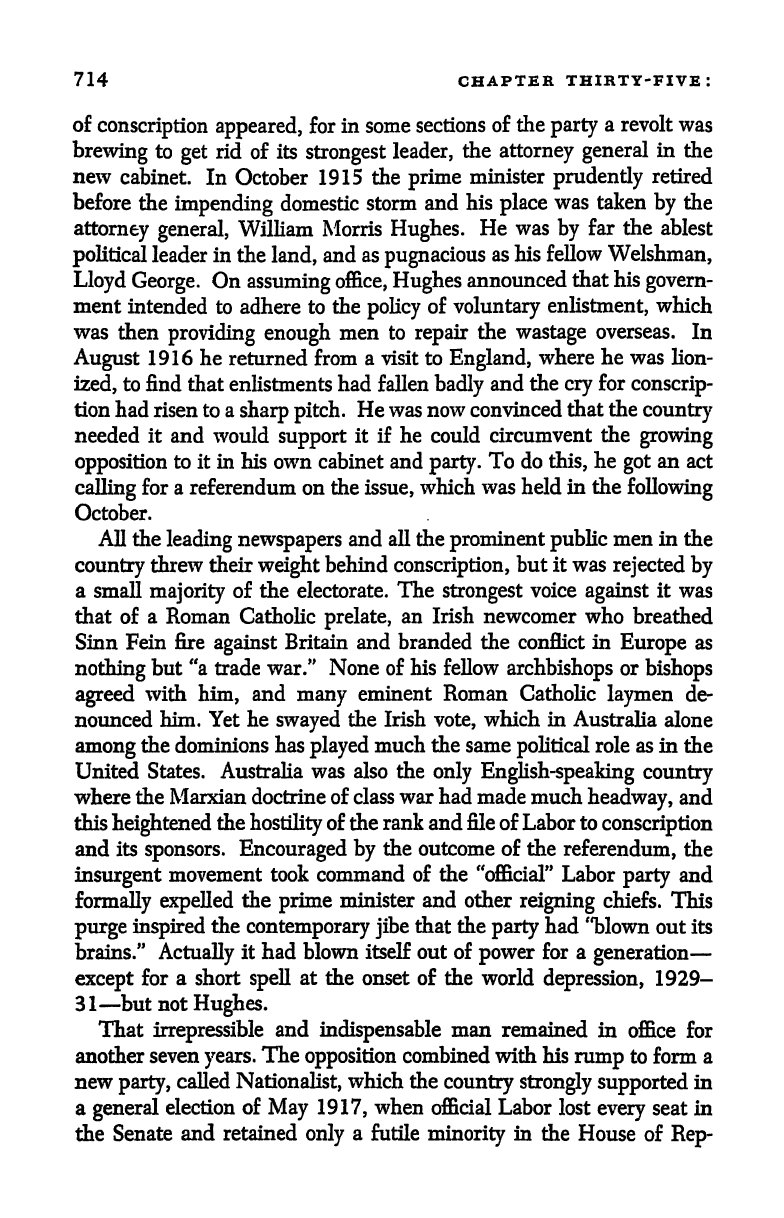
714 CHAPTER
THIRTY-FIVE:
of
conscription
appeared,
for
in
some
sections
of
the
party
a revolt
was
brewing
to
get
rid
of its
strongest
leader,
the
attorney general
in
the
new
cabinet.
In October 1915
the
prime
minister
prudently
retired
before
the
impending
domestic
storm
and his
place
was
taken
by
the
attorney
general,
William
Morris
Hughes.
He
was
by
far the
ablest
political
leader
in
the
land,
and as
pugnacious
as his
fellow
Welshman,
Lloyd
George.
On
assuming
office,
Hughes
announced
that his
govern-
ment
intended to adhere to
the
policy
of
voluntary
enlistment,
which
was
then
providing enough
men
to
repair
the
wastage
overseas.
In
August
1916 he
returned
from
a visit to
England,
where
he was
lion-
ized,
to find that
enlistments
had
fallen
badly
and
the
cry
for
conscrip-
tion had
risen
to
a
sharp pitch.
He
was now convinced
that
the
country
needed it and
would
support
it if
he could
circumvent
the
growing
opposition
to it in his
own
cabinet
and
party.
To
do
this,
he
got
an
act
calling
for
a
referendum
on
the
issue,
which
was held in
the
following
October.
All
the
leading
newspapers
and
all the
prominent
public
men in
the
country
threw
their
weight
behind
conscription,
but it was
rejected
by
a small
majority
of the electorate.
The
strongest
voice
against
it
was
that of
a
Roman Catholic
prelate,
an Irish newcomer
who
breathed
Sinn Fein
fire
against
Britain and
branded
the
conflict
in
Europe
as
nothing
but
"a
trade
war."
None of
his fellow
archbishops
or
bishops
agreed
with
him,
and
many
eminent Roman Catholic
laymen
de-
nounced
him. Yet
he
swayed
the
Irish
vote,
which
in
Australia alone
among
the
dominions
has
played
much
the
same
political
role as
in the
United
States.
Australia was also the
only
English-speaking country
where
the Marxian doctrine of class
war
had made much
headway,
and
this
heightened
the
hostility
of
the
rank and file of Labor to
conscription
and its
sponsors. Encouraged
by
the outcome
of the
referendum,
the
insurgent
movement
took command of the "official"
Labor
party
and
formally
expelled
the
prime
minister and other
reigning
chiefs.
This
purge
inspired
the
contemporary
jibe
that
the
party
had "blown
out its
brains."
Actually
it had blown
itself out
of
power
for a
generation
except
for
a
short
spell
at
the onset of the
world
depression,
1929-
31
but not
Hughes.
That
irrepressible
and
indispensable
man
remained
in
office for
another
seven
years.
The
opposition
combined
with his
rump
to form
a
new
party,
called
Nationalist,
which the
country
strongly
supported
in
a
general
election
of
May
1917,
when
official
Labor
lost
every
seat in
the Senate
and retained
only
a
futile
minority
in
the
House of
Rep-
